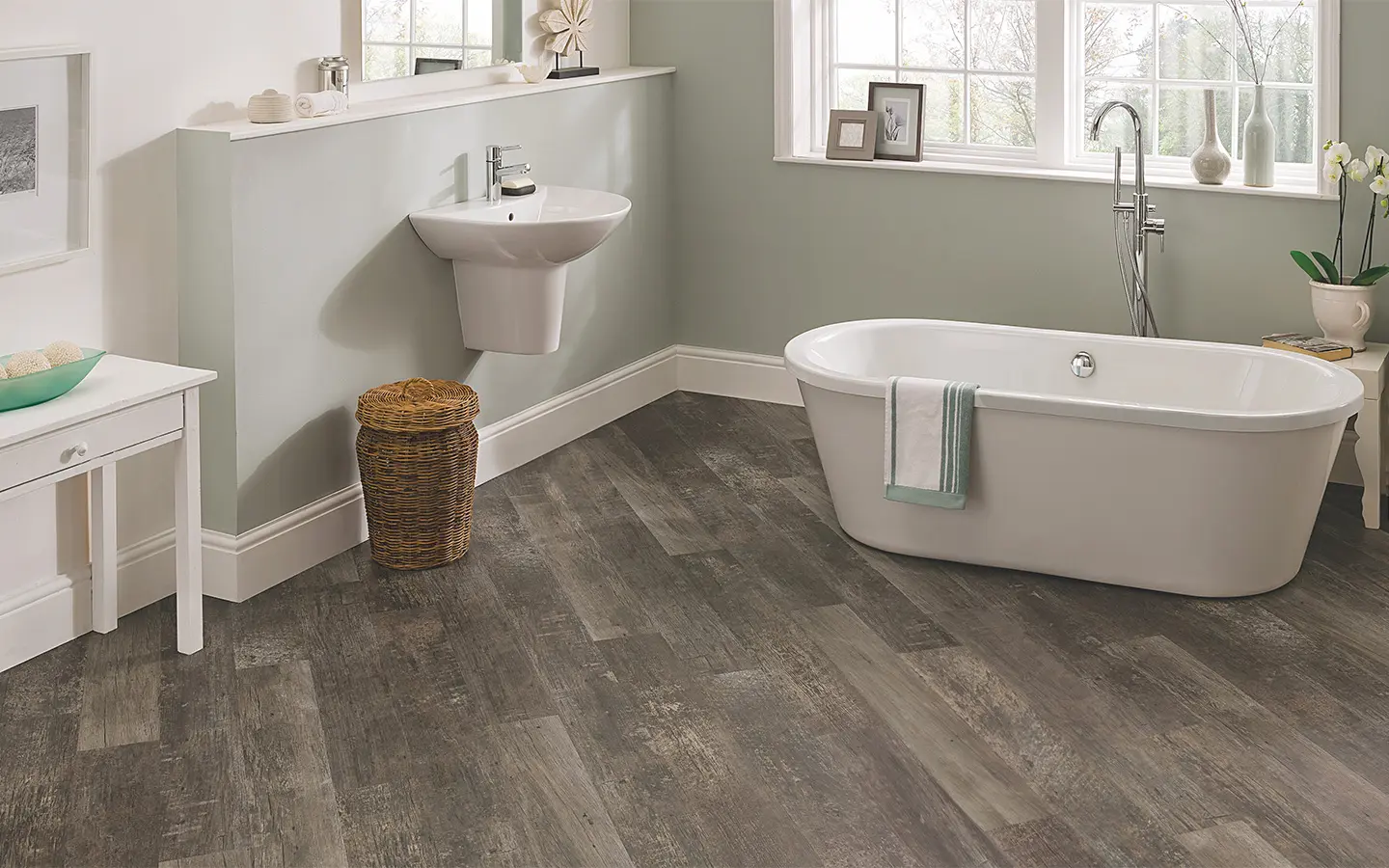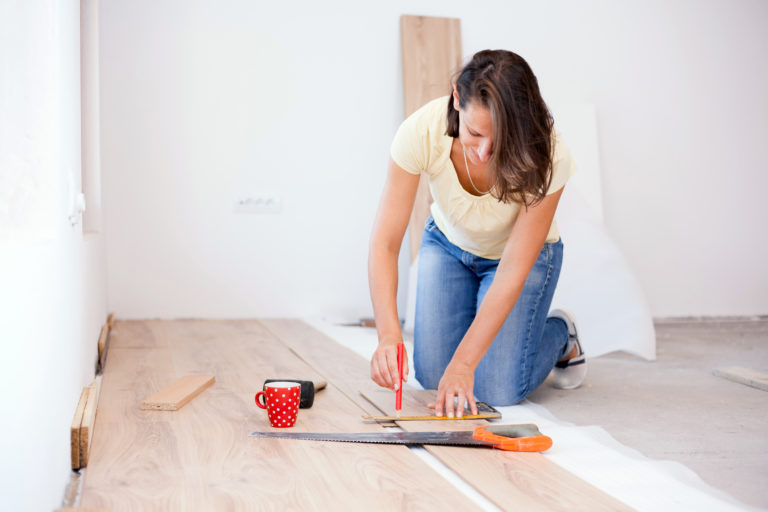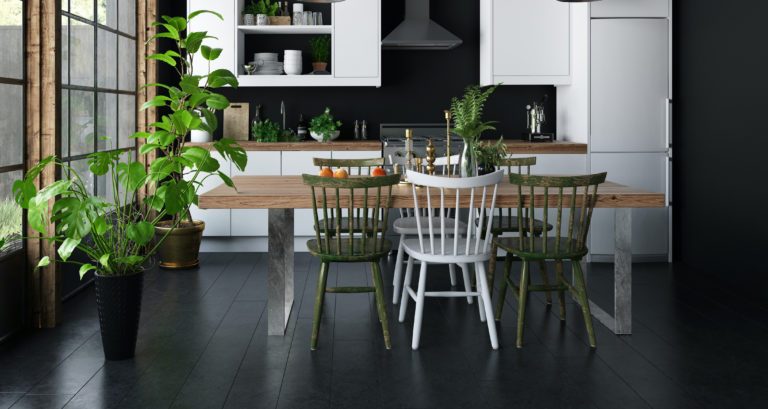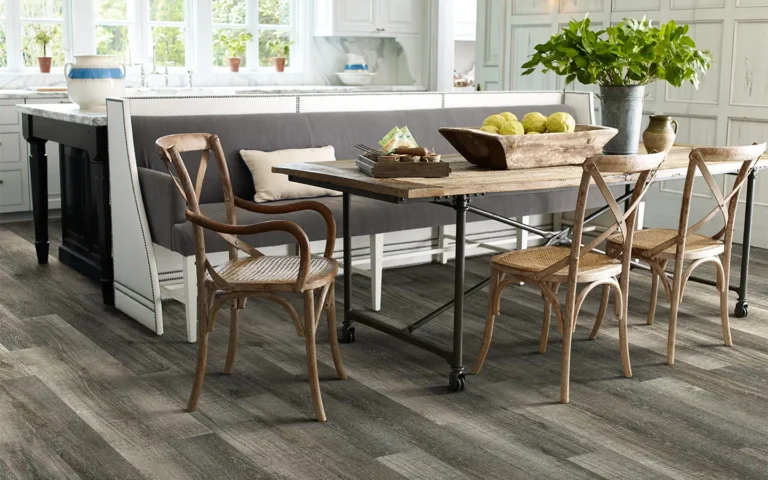When you’re in the market for new floors, there’s a lot to chew on. You’ve got to think about where you’re laying these floors down, your daily habits, what your wallet says, and what you like to look at every day. Every type of flooring has its own set of pros and cons.
But here’s the deal with vinyl flooring: it’s kind of like the quiet kid in class who turns out to be awesome once you get to know them. Vinyl’s been climbing the popularity charts for good reason. If you’re eyeing vinyl for your place, you’re on to something.
We are about to dive into the details and intricacies of vinyl flooring – what it’s good for, how it stacks up in the bang-for-your-buck department, what kind of mileage you can expect out of it, and the whole analysis on its pros and cons. We’re pulling knowledge from deep dives into reviews and tapping into some hard-earned wisdom from folks who’ve been laying floors for a long time. Let’s get into it.
What is Vinyl Flooring?
First of all, let us explain what vinyl flooring is exactly.
Vinyl flooring is a synthetic flooring option that’s known for its durability, versatility, and resistance to moisture. It’s made primarily from polyvinyl chloride (PVC) resin, a type of plastic known for its toughness. This is mixed with various compounds to achieve different colors, textures, and properties.
Vinyl flooring made its debut in the 1930s and gained popularity in the post-war era, especially in the 1950s and 60s, as an affordable and water-resistant flooring option. Over the decades, technological advancements have dramatically improved the quality, appearance, and applications of vinyl flooring.
Composition of Vinyl Flooring
Vinyl plank is composed of 3 layers:
- Core Layer: The backbone of vinyl flooring is the core layer, which provides structure and durability. This core can be rigid in luxury vinyl tiles (LVT) or planks (LVP), offering enhanced stability and resistance to dents.
- Design Layer: Above the core, there’s a high-resolution photographic layer that realistically mimics the appearance of wood, stone, ceramic, and other materials.
- Wear Layer: The top surface is coated with a wear layer, usually made from urethane. This layer protects the floor from scratches, scuffs, and stains, making it ideal for high-traffic areas.
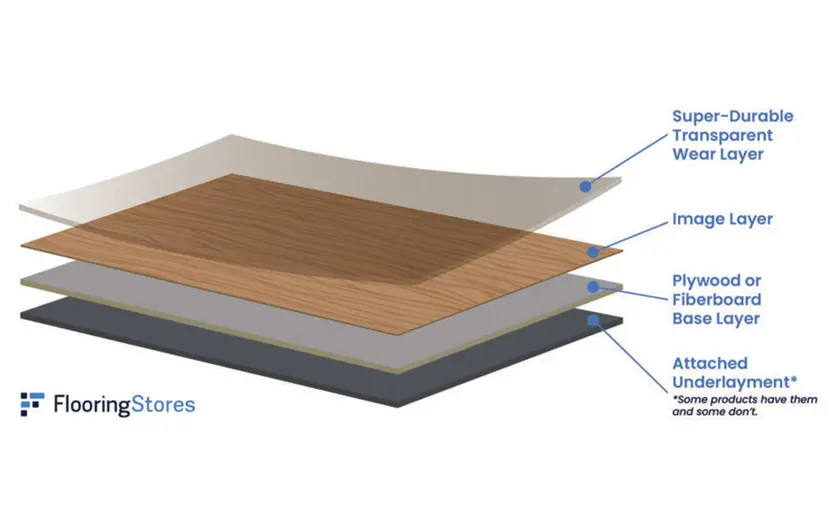
The Ingredients of Vinyl Flooring
At its core, vinyl flooring starts with a mix of materials, but the main ingredient is PVC (polyvinyl chloride). PVC is a type of plastic that’s known for its durability and resistance to water, making it an ideal base for flooring.
PVC and additives
To kick things off, manufacturers take PVC resin and blend it with various additives to enhance its properties. These additives can include:
Plasticizers: These are added to make the PVC flexible and soft to the touch. Without plasticizers, the vinyl would be too rigid and brittle for comfortable flooring.
Stabilizers: These help the PVC maintain its structure and resist degradation over time, especially from heat and UV light.
Pigments: These are used to color the material all the way through, setting the base tone before the design layer is even added.
The mix
This blend of PVC resin and additives is mixed together and rolled out into sheets. These sheets form the base layer or the backbone of the vinyl flooring. It’s from this base that the layering process begins, leading to the addition of the design and wear layers.
So, when we talk about making vinyl flooring, we’re really starting with a plastic-based material that’s engineered to be tough, flexible, and water-resistant. From this foundation, the layers are built up to create the final product that ends up on your floor, complete with realistic designs and protective coatings.
Best Brands of 2024
The Making of Vinyl Flooring
When it comes to making vinyl flooring, it’s all about building it up layer by layer, kind of like making a layered cake, but with materials that stand up to a lot more foot traffic!
Layering
First up is the layering process. Imagine starting with a solid base or core that gives the flooring its strength. This is what keeps your floor from caving in when you drop something heavy on it or when it’s supporting your furniture. On top of this core, we add a design layer. This is where the magic happens – it’s a thin layer that’s going to carry a super detailed photo of whatever surface we want the vinyl to look like, be it oak, slate, or anything in between.
The grand finale of our layer cake is the wear layer, which we lay on top of the design. Think of this as the clear coat on a car; it’s what protects the beauty underneath from getting scuffed up and worn out over time.
Printing
Once we’ve got our layers ready, it’s time to bring in the high-definition photography. This isn’t just any old picture – we’re talking about super crisp, detailed images that look just like the real thing. We apply these images to the design layer to give the flooring its wood, stone, or ceramic appearance. It’s like printing a high-quality photo but for the floor.
Texturing
But we’re not done yet! Now, we need to make sure the flooring feels as real as it looks. This is where texturing comes in. We add textures to the surface that mimic the natural feel of the materials we’re imitating. So, if it’s supposed to look like hardwood, it’ll also feel a bit like hardwood under your feet, complete with the subtle ridges and grooves you’d expect from the real deal.
And there you have it, a step-by-step look at how vinyl flooring is made, from the solid foundation right up to the realistic textures that make it such a versatile and popular flooring choice.
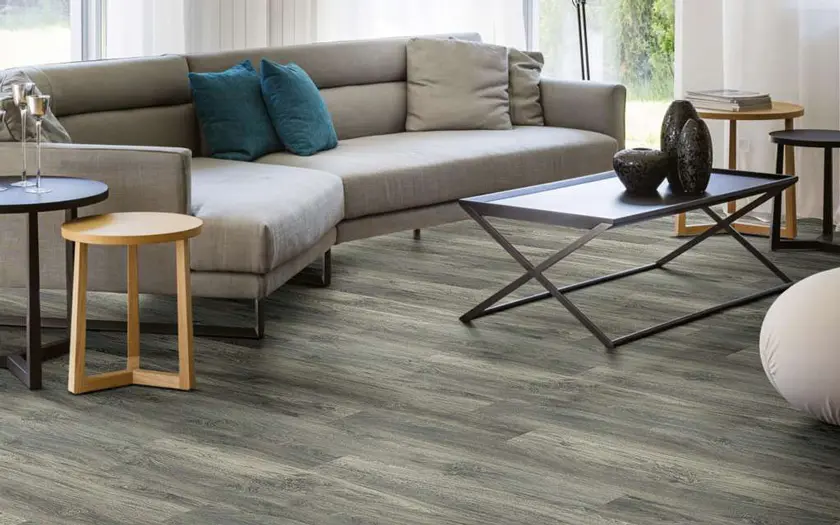
Pros of The Vinyl Flooring
When it comes to choosing the right flooring, it’s all about matching your needs with the right features. Vinyl flooring, with its unique blend of qualities, has a lot to offer. Whether you’re renovating a cozy corner of your home or giving a commercial space a fresh vibe, understanding the advantages of vinyl flooring can help you make a smart, informed decision. Let’s dive into the pros that make vinyl flooring a standout choice in the world of flooring options.
Vinyl flooring is waterproof
Vinyl flooring’s claim to fame includes its remarkable waterproof qualities, making it a prime candidate for areas prone to moisture. Unlike traditional wood or laminate, which can swell or warp when exposed to water, vinyl stands strong against spills, splashes, and humidity.
This waterproof nature means you can install vinyl in bathrooms, kitchens, and basements without worrying about water damage. It’s a game-changer for homes and commercial spaces where spills are part of daily life, offering peace of mind and preserving the integrity of your floors even in the face of life’s little accidents.
It is also quite durable
Vinyl flooring earns high marks for its durability, designed to withstand the daily grind of heavy foot traffic, pets, kids, and everything in between. Its resilience is thanks to the wear layer on top, which acts like a shield against scratches, dents, and stains.
This layer varies in thickness across different types of vinyl, with thicker wear layers offering more protection. High-quality vinyl can last 15-20 years with proper care, maintaining its look and feel without fading or wearing down. Whether it’s for a bustling family home or a high-traffic commercial space, vinyl flooring stands up to the challenge, keeping its cool under pressure and looking good while doing it.
Ease of maintenance is a big plus
One of the standout pros of vinyl flooring is undoubtedly its ease of maintenance. This flooring is practically a no-fuss, no-muss solution for busy lifestyles. Spills? No problem—just a quick wipe and you’re good to go. There’s no need for special cleaners or treatments; regular sweeping and occasional mopping with mild detergent will keep your floors looking like new.
Vinyl’s resistance to stains and moisture means you won’t be on your knees scrubbing at stubborn marks. This low-maintenance aspect makes vinyl an attractive option for those who want the look of hardwood or stone without the upkeep, giving you more time to enjoy your space and less time worrying about floor care.
Vinyl flooring is really affordable
Generally, the cost for vinyl flooring materials can range from as low as $1 to $5 per square foot. This range can vary based on the type of vinyl—whether it’s sheet vinyl, vinyl tile (VT), or luxury vinyl plank (LVP) or tile (LVT). On top of the material cost, if you’re considering professional installation, that might add an additional $1 to $2 per square foot, depending on where you live and the complexity of the job.
These ballpark figures make vinyl flooring a compelling choice for both small-scale DIY projects and larger, professionally installed renovations. Its affordability doesn’t compromise on style or durability, making it a smart pick for those looking to refresh their space without breaking the bank.
It offers a lot of versatility in style and application
Vinyl flooring truly shines when it comes to its variety of styles and versatility for different rooms, making it a chameleon in the flooring world. Whether you’re after the warm look of hardwood, the elegance of stone, or the quirky charm of patterned tiles, vinyl has you covered. This wide range of design options means you can tailor your flooring to match any room’s decor, from a rustic kitchen to a sleek, modern bathroom.
The versatility doesn’t stop at just looks. Vinyl’s durability and water resistance make it suitable for virtually any room in the house. It can brave the high humidity of a bathroom, withstand the spills and traffic of a kitchen, and still look right at home in a cozy bedroom or lively living room. This adaptability makes vinyl flooring a go-to choice for those who want a consistent look throughout their home without worrying about suitability for different living spaces.
With vinyl, you can achieve a harmonious design flow from room to room, all while enjoying the benefits of a durable, easy-to-maintain flooring solution.
Vinyl flooring is quite comfortable
Vinyl flooring scores high on comfort, a feature that’s especially appreciated in spaces where you spend a lot of time on your feet. Its layers, particularly the core and backing, provide a softer, more forgiving surface compared to hard materials like tile or stone. This cushioning effect reduces the strain on your feet, legs, and back, making it a kind choice for kitchens, playrooms, and workspaces where comfort is key.
Moreover, vinyl has a warmer, more insulating quality, keeping the chill off your toes in colder months. This warmth and softness underfoot make vinyl an inviting choice for homes and businesses alike, blending practicality with the kind of everyday luxury that makes a space feel just right. Whether you’re cooking up a storm, playing with the kids, or just enjoying a quiet moment, vinyl flooring adds that touch of comfort that makes your space more enjoyable to live, work, and play in.
And it’s easy to install
Vinyl flooring’s ease of installation is a big win for both DIY buffs and those looking for a quick, professional update to their space. With options like peel-and-stick tiles and planks, you’re looking at a straightforward, no-fuss method perfect for a weekend project.
These simply adhere directly to a prepared subfloor. For a slightly more involved but still manageable DIY task, click-together vinyl offers a satisfying snap-fit installation that requires no glue and can often be laid over existing flooring. This user-friendly approach makes updating your floors a breeze and helps keep costs down if you’re game to take on the installation yourself. It’s a practical, accessible flooring solution that promises a fresh look with minimal hassle.
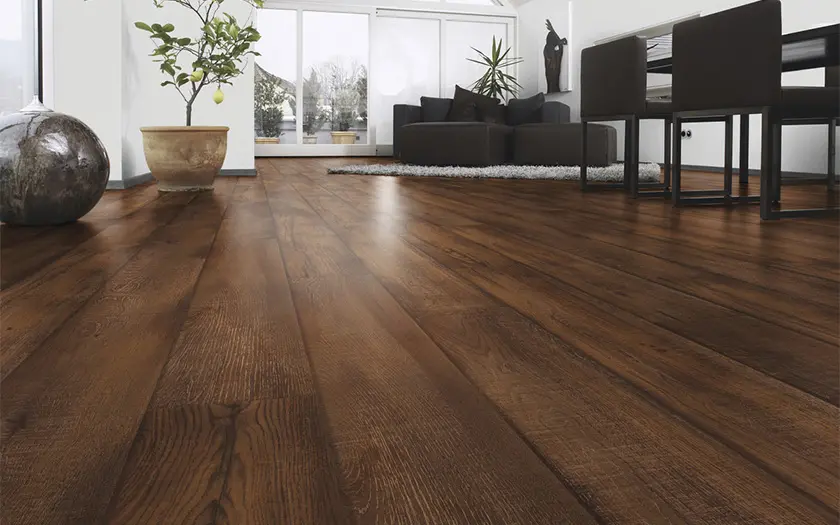
Cons of Vinyl Flooring
While vinyl flooring comes with a long list of benefits, it’s only fair to flip the coin and explore the other side. Let’s take a moment to navigate through the cons of vinyl flooring, ensuring you have the full picture before making your final decision.
Vinyl flooring can have a shorter lifespan
Vinyl flooring, despite its many upsides, does come with a caveat concerning its lifespan. It’s a bit of a mixed bag, really. On one end, you’ve got your entry-level sheet vinyl that might come with a warranty of around six years, which, in the grand scheme of home flooring, isn’t a whole lot of time. Then, on the flip side, premium vinyl products, particularly the rigid types, can boast warranties stretching up to 30 or even 35 years.
This broad range essentially means that not all vinyl floors are created equal, and their longevity can vary significantly based on the quality and types of vinyl flooring you choose. So, when you’re browsing through options, it’s wise to have a chat with your retailer about what kind of mileage you can expect from your vinyl flooring, keeping in mind that while it can mimic the look of wood, tile, or stone beautifully, its lifespan might not always match up to these natural materials.
And it can pose some environmental concerns
Vinyl flooring does face scrutiny when it comes to environmental and health considerations. One of the concerns is the emission of volatile organic compounds (VOCs) post-installation, which can potentially impact indoor air quality and lead to respiratory issues over time.
Recognizing these concerns, some manufacturers are stepping up their game, producing vinyl flooring options that emit lower levels of VOCs. If you’re looking for a healthier, more sustainable choice, keep an eye out for products that are FloorScore certified.
This certification means the flooring complies with the VOC emissions criteria of the California Section 01350 Program, aligning with some of the strictest standards out there. While this certification is a step in the right direction for indoor air quality, it’s important to note that even these improved products don’t fully resolve the environmental footprint concerns associated with vinyl flooring.
Vinyl flooring cannot be refinished
Vinyl flooring, while versatile and durable, does come with a notable limitation in terms of rejuvenation. Unlike its hardwood counterparts, which can be sanded down and refinished multiple times to look brand new, vinyl doesn’t offer this kind of comeback potential. Once vinyl starts showing signs of wear or simply falls out of style, the only real option is replacement.
This inherent characteristic means that while vinyl can be a cost-effective and attractive choice in the short to medium term, it might not have the same longevity or flexibility in updating its appearance as some other flooring materials. It’s an important consideration for those looking to invest in flooring that can adapt and change with evolving tastes and needs.
Vinyl flooring requires perfectly even subfloor
It’s a bit like laying down a beautiful canvas on an uneven surface; any bumps or dips beneath can show through over time. Vinyl, particularly the thinner varieties like sheet vinyl or some planks, can be quite unforgiving if the subfloor isn’t just right. Imperfections such as grit, bumps, or even small debris can eventually telegraph through the vinyl, leading to an uneven surface that not only compromises the look but can also affect the floor’s durability.
Ensuring a smooth, level subfloor is a crucial step in the installation process for vinyl flooring, making it a bit less forgiving than some other flooring options that might be more accommodating to less-than-perfect subfloors. This sensitivity emphasizes the need for careful, sometimes extensive, subfloor preparation to ensure the final installation looks great and stands the test of time.
It can be susceptible to sunlight fading over time
Vinyl flooring, while resilient in many aspects, does have its Achilles’ heel when it comes to prolonged exposure to direct sunlight. Just like how fabrics can lose their vibrancy when left in the sun for too long, certain types of vinyl flooring can experience fading or discoloration over time if they bask in too much natural light.
This isn’t a universal trait across all vinyl flooring, but it’s something to consider, especially for rooms bathed in sunlight for the better part of the day. The impact of UV rays can gradually diminish the once-vivid patterns and colors, leaving floors looking a bit lackluster. When choosing vinyl for sun-drenched spaces, looking into options with UV-resistant coatings or considering window treatments to mitigate exposure can help preserve the floor’s original allure for longer.
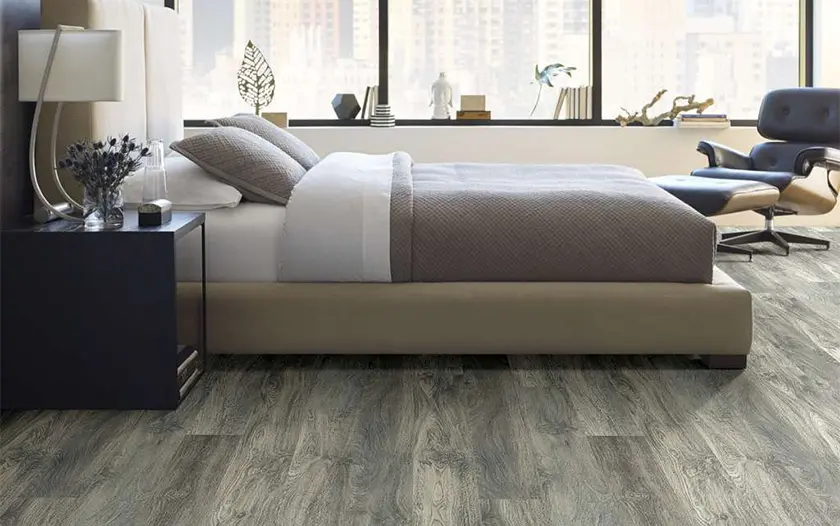
Luxury Vinyl Plank
Luxury Vinyl Plank (LVP) stands out as the premium choice within the vinyl flooring spectrum, effectively countering many of the shortcomings we talked about that are associated with regular vinyl.
Thanks to its advanced construction, LVP brings improved durability and a longer lifespan to the table, making it a sturdy option for both residential and commercial applications.
Aesthetically, luxury vinyl plank excels with high-resolution imagery and textures that closely mimic natural wood and stone, providing a luxury finish without the upkeep required by these materials. This premium vinyl flooring solution also addresses environmental concerns with lower VOC emissions compared to standard vinyl, contributing to healthier indoor air quality.
In terms of cost, LVP is positioned at a higher price point relative to basic vinyl options, reflecting its superior quality and benefits. The price range for LVP can vary widely, generally falling between $2 to $7 per square foot, depending on factors like brand, quality, and design complexity.
While this makes LVP a more significant upfront investment compared to standard vinyl flooring, its durability, aesthetic appeal, and minimal maintenance requirements often translate to better long-term value, making it a wise choice for those looking to avoid the common pitfalls of regular vinyl while still enjoying its practical advantages.
Conclusion
We’ve navigated through the diverse landscape of vinyl flooring, exploring the peaks of its numerous advantages and acknowledging the valleys of its few drawbacks.
From its commendable water resistance and durability to its ease of maintenance and installation, vinyl flooring presents a compelling option for those seeking a blend of practicality, style, and affordability. Its vast array of designs and suitability for various rooms make it a versatile choice for any interior.
On the flip side, we’ve touched on considerations like its finite lifespan compared to natural materials, environmental concerns, limited refinishing options, subfloor sensitivity, and the potential for fading under direct sunlight. These points serve as food for thought, guiding you to make an informed decision that aligns with your needs, values, and lifestyle.In the grand scheme of home improvement, vinyl flooring stands out as a balanced choice, offering a harmonious blend of functionality and aesthetic appeal. Like any flooring option, it has its trade-offs, but for many, the benefits outweigh the cons. Whether you’re renovating a cozy nook or overhauling an entire space, you have plenty of vinyl flooring brands that offer a versatile, durable, and stylish foundation to build upon.
About The Author

Lauren Moore
February 2, 2024
Proud flooring aficionado and office dog mom, "Flauren" has been a professional writer and editor for more than a decade (though she still maintains her magnum opus was "The Day it Snowed Slurpees," written at the age of 6).
